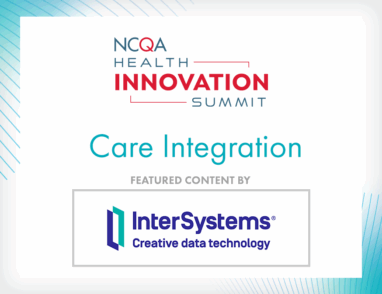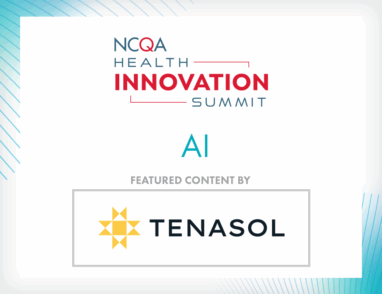Democratizing Digital Quality Measurement
April 5, 2023 · Andy Reynolds
An early adopters program for NCQA’s newest offering, Digital Content Services, expands digital quality measurement to fit the workflows of a wide range of organizations—beyond the health plans NCQA has traditionally served.
NCQA Director of Product Management Burke Burnett announced the early adopter opportunity at our February 2023 Future of HEDIS webinar.
To see why the spread of digital measurement is important, it helps to understand the burdens and barriers that democratized digital measurement can overcome.
Problems to Solve
Quality measurement has accomplished a lot. Its reach and impact keep growing. But traditional quality measurement also:
- Risks human error. Getting measures into health plans’ IT systems is labor intensive, and invites human error. Organizations must read, interpret and rekey their understanding of our 800-page HEDIS Volume 2 publication into their computers. That’s a big job, and people make mistakes.
How can we reduce human error?
- Risks unwarranted variations. Some users modify measures to focus on specific populations. To ensure measures’ integrity and comparability, in 2019 we began expanding their Allowable Adjustments, licensing and certification. But that flexibility and harmonization of how measures are used goes only so far, considering the measures are written to evaluate health plans’ quality.
How can we make measurement more flexible, and still preserve its clinical intent?
- Is slow and retrospective. It takes years to develop and deploy measures for public reporting. Getting quality results into the hands of payers and providers who use them takes a long time, too: There’s ongoing data collection, followed by spring auditing and summer reporting of HEDIS results from health plans to NCQA. Then we aggregate, analyze and report results through the summer and into fall.
How can measurement be faster and more prospective?
Digital measurement addresses these problems.
The Digital Starter Pack
Digital Content Services is helping organizations get started in digital measurement through an online tool that deploys 14 out-of-box, configurable digital quality measures: the Digital Starter Pack.
- “Out-of-box” means digital HEDIS measures that plug into IT systems. Users don’t have to read, interpret or code measures. That means faster deployment and lower chance of human error.
- “Configurable” means users can make Allowable Adjustments to measures with a click. That flexibility helps users adapt measures without breaking the clinical intent.
We’re adding to the starter pack by digitizing more measures in 2023 and beyond.
Meanwhile, the initial 14 measures include:
- Six that use our Electronic Clinical Data Systems (ECDS) reporting method.
- Five that CMS has designated for the Universal Foundation (UF).
Prevention
- Adult Immunization Status (AIS-E) (UF).
- Breast Cancer Screening (BCS-E) (UF).
- Cervical Cancer Screening (CCS-E).
- Childhood Immunization Status (CIS-E) (UF).
- Colorectal Cancer Screening (COL-E) (UF).
- Immunizations for Adolescents (IMA-E) (UF).
Chronic Disease
- Depression Remission or Response for Adolescents and Adults (DRR-E).
- Depression Screening and Follow-Up (DSF-E).
- Metabolic Monitoring for Children and Adults (APM-E).
- Utilization of the PHQ-9 to Monitor Depression Symptoms for Adolescents and Adults (DMS-E).
Appropriateness of Care
- Avoidance of Antibiotic Treatment for Acute Bronchitis/Bronchiolitis (AAB).
- Appropriate Testing for Pharyngitis (CWP).
- Appropriate Treatment for Upper Respiratory Infection (URI).
- Use of Opioids from Multiple Providers (UOP).
As we explain in our September 2021 Future of HEDIS webinar (at 45:30), democratizing digital measurement means making measurement work in at least six broad situations, or “use cases”:
- Performance measurement. “I just want to understand and use a measure.”
- Performance management. “How well are we doing, and why?”
- Quality improvement. “How can we get better?”
- Optimization. “How can we make the most of our improvement efforts?”
- Reporting. “Dear Partner Org: Here are results we can both trust.”
(This is the original, official purpose of HEDIS—the one thing we’ve always written HEDIS measures to do.) - Payment. “What’s the financial impact of our quality performance?”
Early adopters of Digital Content Services focus on performance management and performance improvement. Performance reporting persists, in keeps with the core purpose of HEDIS. We’ll expand into other use cases over the next few years.
Want to become an early adopter? You must be:
- Cloud capable. This is a vital privacy and security protection. Digital Content Services is a “containerized” solution. That means our software goes in users’ Azure, AWS or Google Cloud environment, where users have complete control. They run their own data, and they don’t send private health information to NCQA.
- FHIR® ready. FHIR expertise ensures that early adopters can follow our FHIR Implementation Guide, use our FHIR-enabled digital measures and produce useful, interoperable outputs. Read what we think about FHIR’s importance to quality’s future.
- Interested in value-based care measures. Background certifying, reporting or trying to improve performance on the starter pack’s 14 measures—or on similar measures—is a plus. Democratizing digital measurement means preparing for the world of value-based contracting. We want to work with organizations that embrace the future.
Your Next Move
- Find out more about the Digital Content Solutions early adopter program.
- Watch the discussion of Digital Content Solutions at our Future of HEDIS webinar.







